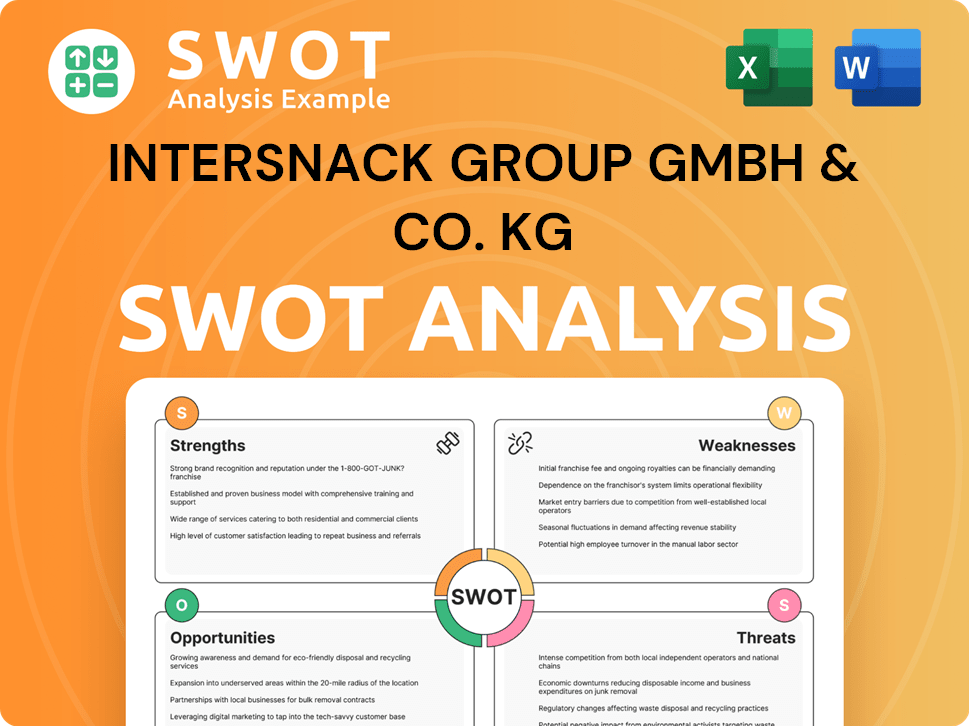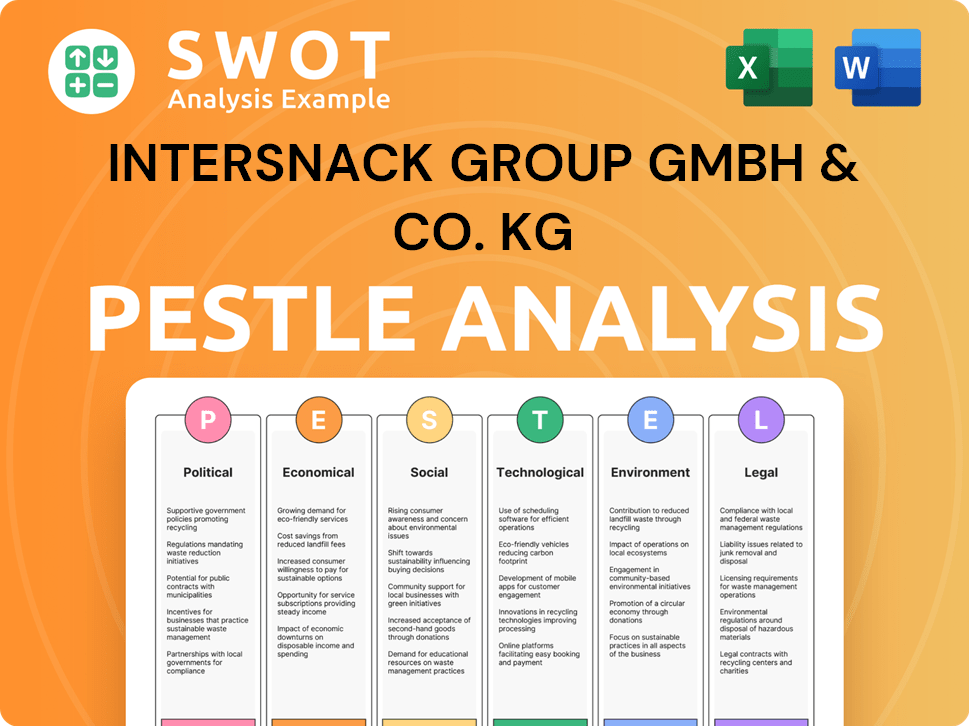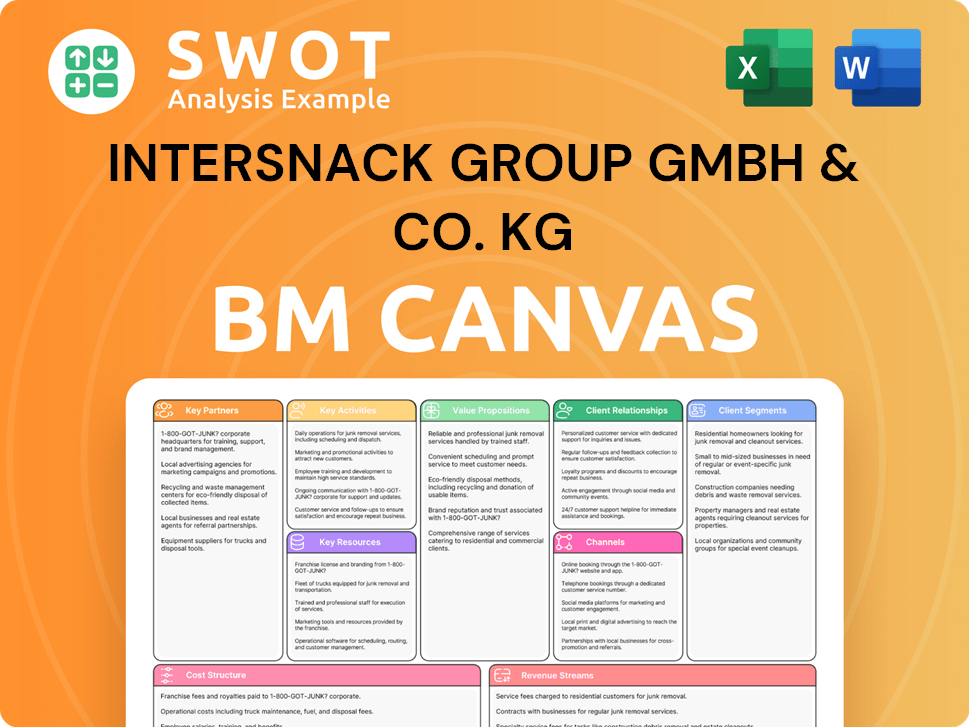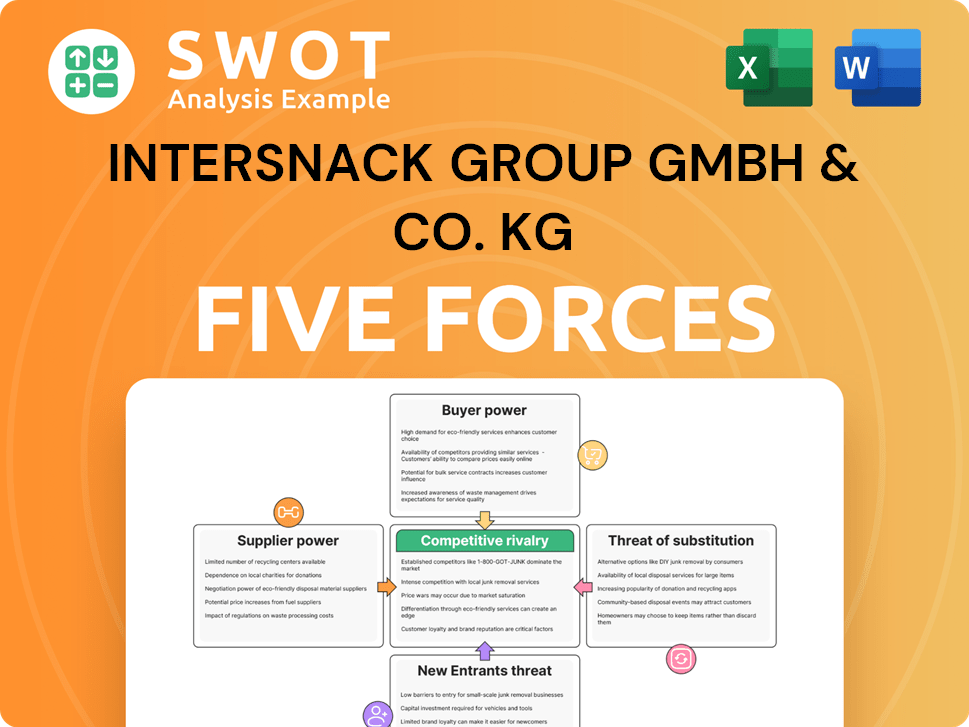Intersnack Group GmbH & Co. KG Bundle
How did Intersnack Group become a European snack giant?
Dive into the Intersnack Group GmbH & Co. KG SWOT Analysis and discover the fascinating journey of a company that started with a simple bag of chips and grew to dominate the European snack market. From its humble beginnings in Germany in 1968, Intersnack Group has transformed the food industry, expanding its reach and influence across continents. Explore the key milestones and strategic decisions that shaped this snack company into a global powerhouse.

Intersnack Group's story offers valuable insights for investors and business strategists alike. Understanding the Intersnack history reveals the importance of adaptability, innovation, and strategic acquisitions in the competitive landscape. Examining its financial performance and geographic presence provides a blueprint for success in the European snack market and beyond. The company's diverse portfolio of brands, including funny-frisch and Chio, showcases its ability to cater to a wide range of consumer preferences.
What is the Intersnack Group GmbH & Co. KG Founding Story?
The story of the Intersnack Group, a major player in the European snack market, begins in Germany. The company's roots are firmly planted in 1968, the year it started producing potato chips. This marked the initial steps in what would become a significant force in the food industry.
While the exact details of the founders are not always highlighted, the evolution of Intersnack involves the merging of several entities. The legal name of the group is Intersnack Knabber-Gebäck GmbH & Co. KG. Its history also includes the early production of chips under the Chio brand by Irmgard von Opel and her sons, starting in 1962. Later, in 1968, Pfeifer & Langen began producing potato chips under the Chipsfrisch brand in Cologne.
The Intersnack Group, as it is known today, was officially formed in 2008. This was the result of combining Intersnack Knabber-Gebäck (established in 1968) and The Nut Company. The goal from the start was to become a leading savory snack manufacturer, a vision pursued through both internal growth and strategic acquisitions. As a privately held company, Intersnack takes a long-term approach, emphasizing innovation, entrepreneurship, creativity, and teamwork. For a deeper dive into the competitive environment, you can explore the Competitors Landscape of Intersnack Group GmbH & Co. KG.
Intersnack's journey from its origins to its current status is marked by strategic moves and expansions.
- 1962: Irmgard von Opel and her sons begin producing chips under the Chio brand.
- 1968: Pfeifer & Langen starts producing potato chips under the Chipsfrisch brand in Cologne.
- 2008: The Intersnack Group is formed through the combination of Intersnack Knabber-Gebäck and The Nut Company.
- The company has consistently expanded its portfolio through acquisitions and organic growth, establishing a strong presence in the European snack market.
Intersnack Group GmbH & Co. KG SWOT Analysis
- Complete SWOT Breakdown
- Fully Customizable
- Editable in Excel & Word
- Professional Formatting
- Investor-Ready Format

What Drove the Early Growth of Intersnack Group GmbH & Co. KG?
The early growth of the Intersnack Group, a prominent snack company, was marked by strategic mergers and the expansion of its product offerings. The company's initial foray into the snack market included the production of its first potato chips in 1968. A pivotal moment in its history was the 1995 merger of Convent-Gruppe and Wolf Snack und Gebäck GmbH.
The foundation of the Intersnack Group's success was built on its early product launches. The introduction of potato chips in 1968 marked the beginning of its journey in the food industry. This initial step laid the groundwork for the company's future expansion and diversification within the European snack market.
The 1995 merger of Convent-Gruppe and Wolf Snack und Gebäck GmbH was a significant event in Intersnack history. This consolidation brought together popular German brands like Chio and funny-frisch. This strategic move was crucial for strengthening its market position and expanding its brand portfolio.
Intersnack Group's expansion into new markets was a key element of its early growth. The Chio brand's entry into Slovenia in 1994 was a strategic move. The company continued to strengthen its presence with brands like Wolf, Goldfischli, and POM-BÄR, solidifying its position in the European snack market.
Major acquisitions played a crucial role in fueling Intersnack's growth. The 2008 acquisition of Kelly expanded its reach into Austria, Slovenia, the Adriatic, Italy, and Switzerland. The 2012 acquisition of KP Snacks from United Biscuits for £500 million significantly boosted its presence in the UK.
By 2021, Intersnack Group's geographic presence spanned over 30 countries across Europe, Australia, and New Zealand. The company also focused on operational improvements, such as implementing Aptean Process Manufacturing OEE to enhance productivity. For more details on the Owners & Shareholders of Intersnack Group GmbH & Co. KG, refer to the linked resource.
Intersnack Group GmbH & Co. KG PESTLE Analysis
- Covers All 6 PESTLE Categories
- No Research Needed – Save Hours of Work
- Built by Experts, Trusted by Consultants
- Instant Download, Ready to Use
- 100% Editable, Fully Customizable

What are the key Milestones in Intersnack Group GmbH & Co. KG history?
The Intersnack Group has achieved significant milestones throughout its history, evolving into a major player in the European snack market. The Intersnack history is marked by strategic expansions and a growing portfolio of brands, solidifying its position within the food industry.
| Year | Milestone |
|---|---|
| Ongoing | Continuous organic growth and strategic acquisitions have expanded Intersnack Group's market presence. |
| Ongoing | The company has built a diverse portfolio of local and international snack brands, including funny-frisch, Chio, and Hula Hoops. |
| 2022 | Achieved an 11% reduction in packaging use. |
Intersnack GmbH has consistently focused on product innovation, particularly in response to consumer demand for healthier options. This includes reformulating recipes to use cleaner ingredients and reduce saturated fat and salt.
The company is focused on reformulating recipes to include clean, natural ingredients, aligning with consumer preferences for healthier snack options.
Intersnack Group aims to remove all remaining artificial taste enhancers, colors, or sweeteners from its branded products by 2025.
Despite its successes, Intersnack Group has faced challenges common to large food companies, such as intense market competition and supply chain complexities. The company has also addressed internal operational challenges through digital transformation.
Navigating a highly competitive market remains a key challenge for Intersnack Group, requiring continuous innovation and strategic positioning.
Addressing complex supply chain issues, particularly concerning environmental impact, is a focus, with a commitment to sustainable practices.
Intersnack Group has undertaken a digital transformation journey using Infor's CloudSuite Food & Beverage solutions to streamline processes and centralize data.
The company has a robust sustainability strategy with clear, short-term targets, including reducing packaging use by 15% and achieving 100% plastic packaging recyclability by the end of 2025.
A sustainable agriculture program supports farmers and suppliers in transitioning to regenerative practices, specifically addressing Scope 3 emissions.
Intersnack Group focuses on fostering a culture of 'servant leadership' to empower employees and improve business results.
Intersnack Group GmbH & Co. KG Business Model Canvas
- Complete 9-Block Business Model Canvas
- Effortlessly Communicate Your Business Strategy
- Investor-Ready BMC Format
- 100% Editable and Customizable
- Clear and Structured Layout

What is the Timeline of Key Events for Intersnack Group GmbH & Co. KG?
The Intersnack Group has a rich history, marked by strategic mergers, acquisitions, and a focus on expansion within the European snack market and beyond. From its early beginnings in Germany, the snack company has grown significantly, becoming a major player in the food industry.
| Year | Key Event |
|---|---|
| 1968 | The company began producing its first potato chips in Germany, marking the start of its journey. |
| 1995 | Intersnack Knabber-Gebäck GmbH & Co. KG was established through the merger of Convent-Gruppe and Wolf Snack und Gebäck GmbH. |
| 2008 | Intersnack Group was formed by combining Intersnack Knabber-Gebäck and The Nut Company, with Maarten Leerdam appointed as Executive Chairman and CEO. |
| 2008 | Kelly became part of the Intersnack Group. |
| 2012 | Intersnack acquired KP Snacks from United Biscuits for £500 million, expanding its presence in the UK. |
| 2016 | Henrik Bauwens joined Intersnack Group as CFO. |
| 2019 | Intersnack formed Unisnack ANZ, a joint venture with Universal Robina for Griffin's Foods and Snack Brands Australia. |
| 2021 | Universal Robina sold its remaining 60% stake in Unisnack ANZ to Intersnack; Fabien Duvilla joined Intersnack as Group Commercial Director. |
| 2022 | Intersnack achieved an 11% reduction in packaging materials. |
| 2023 | Fabien Duvilla became a Group Board Member; KP Snacks, an Intersnack subsidiary, reported a pre-tax profit of £93.7 million. |
| 2024 | Intersnack Group generated sales of more than 4.5 billion euros. |
| April 2025 | A new solar generation park, capable of generating nearly 50% of Intersnack's total European electric energy needs, becomes operational. |
Intersnack Group is committed to sustainability, aiming for 100% plastic packaging recyclability by the end of 2025. The company also plans to reduce its CO2 emissions by 30% by 2025 compared to 2010 levels, demonstrating a strong focus on environmental responsibility within the food industry.
The company is leveraging AI and data analytics to improve product quality and expand its market presence. Intersnack Group is also focused on recipe reformulations, aiming to eliminate artificial additives from its branded products by 2025, aligning with consumer preferences.
By 2032, Intersnack targets using 100% renewable electricity across its operations. This initiative, combined with strategic use of technology, highlights Intersnack's commitment to operational excellence and environmental stewardship, crucial for its long-term success.
In the processed cashew market, a key area for Intersnack, a compound annual growth rate of almost 7.0% is forecasted until 2035. This growth is driven by the increasing demand for plant-based and clean-label products, indicating a strategic focus on evolving consumer trends.
Intersnack Group GmbH & Co. KG Porter's Five Forces Analysis
- Covers All 5 Competitive Forces in Detail
- Structured for Consultants, Students, and Founders
- 100% Editable in Microsoft Word & Excel
- Instant Digital Download – Use Immediately
- Compatible with Mac & PC – Fully Unlocked

Related Blogs
- What is Competitive Landscape of Intersnack Group GmbH & Co. KG Company?
- What is Growth Strategy and Future Prospects of Intersnack Group GmbH & Co. KG Company?
- How Does Intersnack Group GmbH & Co. KG Company Work?
- What is Sales and Marketing Strategy of Intersnack Group GmbH & Co. KG Company?
- What is Brief History of Intersnack Group GmbH & Co. KG Company?
- Who Owns Intersnack Group GmbH & Co. KG Company?
- What is Customer Demographics and Target Market of Intersnack Group GmbH & Co. KG Company?
Disclaimer
All information, articles, and product details provided on this website are for general informational and educational purposes only. We do not claim any ownership over, nor do we intend to infringe upon, any trademarks, copyrights, logos, brand names, or other intellectual property mentioned or depicted on this site. Such intellectual property remains the property of its respective owners, and any references here are made solely for identification or informational purposes, without implying any affiliation, endorsement, or partnership.
We make no representations or warranties, express or implied, regarding the accuracy, completeness, or suitability of any content or products presented. Nothing on this website should be construed as legal, tax, investment, financial, medical, or other professional advice. In addition, no part of this site—including articles or product references—constitutes a solicitation, recommendation, endorsement, advertisement, or offer to buy or sell any securities, franchises, or other financial instruments, particularly in jurisdictions where such activity would be unlawful.
All content is of a general nature and may not address the specific circumstances of any individual or entity. It is not a substitute for professional advice or services. Any actions you take based on the information provided here are strictly at your own risk. You accept full responsibility for any decisions or outcomes arising from your use of this website and agree to release us from any liability in connection with your use of, or reliance upon, the content or products found herein.